Trinh T. Minh-ha
TRINH T. MINH-HA
Born in Vietnam, Trinh T. Minh-ha is a filmmaker, writer and music composer. Her works include:
Films::
WHAT ABOUT CHINA? (135 mins digital film, 2021)
FORGETTING VIETNAM (90 mins digital film, 2015)
NIGHT PASSAGE (98mins digital narrative film, 2004)
THE FOURTH DIMENSION (Japan, 87 mins digital film, 2001)
A TALE OF LOVE (108 mins 35mm narrative, 1995)
SHOOT FOR THE CONTENTS (China, 102 mins 16mm, 1991)
SURNAME VIET GIVEN NAME NAM (108 mins 16mm, 1989)
NAKED SPACES - LIVING IS ROUND (135 mins 16mm, 1985)
REASSEMBLAGE (40 mins 16mm, 1982)
Books: including • Lovecidal. Walking with The Disappeared (2016), • D-Passage. The Digital Way (2013), • Elsewhere Within Here. Immigration, Refugeeism and The Boundary Event (2010); • The Digital Film Event (2005), • Cinema Interval (1999), • Framer Framed (1992), • When the Moon Waxes Red. Representation, Gender and Cultural politics (1991), Woman, Native, Other. Postcoloniality and Feminism (1989), • En minuscules (poems, 1987); and in collaboration with Jean-Paul Bourdier, • A World in Dwelling (2011), • Habiter un monde (Paris, 2006), • Drawn from African Dwelling (1996), •African Spaces - Designs for Living in Upper Volta (1985);
Large-scale multi-media installations: • “Nothing But Ways” (in coll. with LM Kirby, 1999, Yerba Buena Center for the Arts, San Francisco), • “The Desert is Watching” (2003, Kyoto Art Biennale), and • “L'Autre marche” (The Other Walk, 2006-2009 at Musée du Quai Branly, Paris, both in coll. with Jean-Paul Bourdier), • “Old Land New Waters”, Okinawa Fine Arts Museum (2007; 2009); Guangzhou Art Triennial in China (2008), Chechnya Emergency Biennale (2008), Le Quartier, Quimper, France ( 2016) , Museo Revoltella, Trieste, Italy (2018), and • “In Transit: Between and Beyond” (in coll. with LM Kirby, Manifesta 13, Marseille, France 2020).
The recipient of numerous awards and grants (including the 2014 Wild Dreamer Lifetime Achievement Award from the Subversive Festival in Zagreb, Croatia; the 2012 Women's Caucus for Art Lifetime Achievement Award; the "Trailblazers" Award at MIPDOC, Cannes; AFI National Independent Filmmaker Maya Deren Award, her films have been honored in over 64 retrospectives-in Chile, Bolivia, Peru, Singapore, Korea, Austria, Denmark, Sweden, Argentina, Croatia, Columbia, Mexico, Finland, Brazil, Canada, Italy, Spain, the Netherlands, Slovenia, France, Germany, Switzerland, Austria, Japan, India, Taiwan, Hong Kong, Australia, the UK, the US—and were exhibited at the international contemporary art exhibition Documenta 11 (2002) in Germany. They have shown widely in the States, in Canada, Senegal, Australia, and New Zealand, as well as in Europe and Asia. Reassemblage was initially exhibited at The New York Film Festival (1983) and has since then become a classic of critical ethnographic films. Naked Spaces received the Blue Ribbon Award for Best Experimental Feature at the American Int'l. Film Festival and the Golden Athena Award for Best Feature Documentary at the Athens International Film Festival in 1986; it toured nationally and internationally with the 1987 Biennial of the Whitney Museum of American Art. Surname Viet Given Name Nam has received the Film as Art Award from the Society for the Encouragement of Contemporary Art (SF Museum of Modern Art), the Blue Ribbon Award at the American Film and Video Festival, and the Merit Award from the Bombay International Film Festival. Shoot for the Contents won the Jury's Best Cinematography Award at the 1992 Sundance Film Festival and the Best Feature Documentary Award at the Athens International Film Festival, and toured internationally with the 1993 Biennale of the Whitney Museum. A Tale of Love showed internationally in over twenty-four film festivals, including Berlin and Toronto. The Fourth Dimension (Locarno, Viennale, Edinburg, London), Night Passage (UK, Austria, Spain, Japan, Korea, Shanghai) and Forgetting Vietnam (Cinéma du Réel, Paris; Copenhagen; Singapore; Taiwan; Sweden; Vancouver and Montreal, Canada etc.) continue to exhibit widely.
Trinh Minh-ha has traveled and lectured extensively on film, art, feminism, and cultural politics. She taught at the National Conservatory of Music in Dakar, Senegal (1977-80); at universities such as Cornell, San Francisco State, Smith, and Harvard, Ochanomizu (Tokyo), Ritsumeikan (Kyoto), Dongguk (Seoul); and is Professor of The Graduate School at the University of California, Berkeley. (4/22)
Available Title(s):

What About China?
A film by Trinh T. Minh-ha, 2022, 135 min, Color
Drawing from footages shot mostly in 1993–1994 in villages of Eastern and Southern China linked in common lore to the remote origins of China’s civilizations, the film takes the notion of harmony in China as a site of creative manifestation. Highly valued as a virtue and a guiding criterion in ethics, harmony has played an…
Read More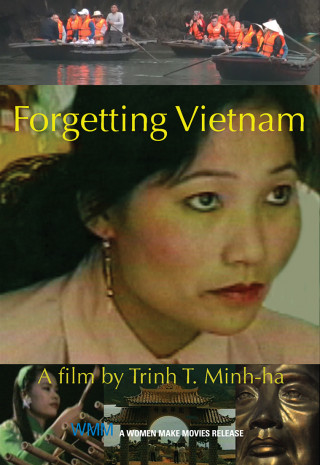
Forgetting Vietnam
A film by Trinh T. Minh-ha, 2015, 90 min,
One of the myths surrounding the creation of Vietnam involves a fight between two dragons whose intertwined bodies fell into the South China Sea and formed Vietnam’s curving S-shaped coastline. Influential feminist theorist and filmmaker Trinh T. Minh-ha’s lyrical film essay commemorating the 40th anniversary of the end of the war draws inspiration from ancient…
Read MoreNight Passage
A film by Trinh T. Minh-ha, 2004, 98 min, Color
Made in homage to Kenji Miyazawa’s children’s sci-fi classic MILKY WAY RAILROAD, NIGHT PASSAGE is an experimental feature from celebrated filmmaker Trinh T. Minh-ha and artist Jean Paul Bourdier (REASSEMBLAGE, THE FOURTH DIMENSION, A TALE OF LOVE, SHOOT FOR THE CONTENTS, SURNAME VIET GIVEN NAME NAM). This provocative digital tale tells the story of three…
Read MoreThe Fourth Dimension
A film by Trinh T. Minh-ha, 2001, 87 min, Color
Acclaimed filmmaker Trinh T. Minh-ha ventures into the digital realm with her stunning feature, THE FOURTH DIMENSION, an incisive and insightful examination of Japan through its art, culture, and social rituals. As is the case with Trinh's previous films, her film is a multi-layered work addressing issues around its central theme: the experience of time,…
Read More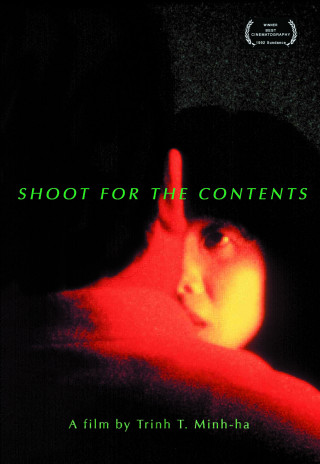
Shoot for the Contents
A film by Trinh T. Minh-ha, 1991, 101 min, Color
Reflecting on Mao’s famous saying, “Let a hundred flowers blossom and a hundred schools of thought contend,” Trinh T. Minh-ha’s film—whose title refers in part to a Chinese guessing game—is a unique excursion into the maze of allegorical naming and storytelling in China. The film ponders questions of power and change, politics and culture, as…
Read More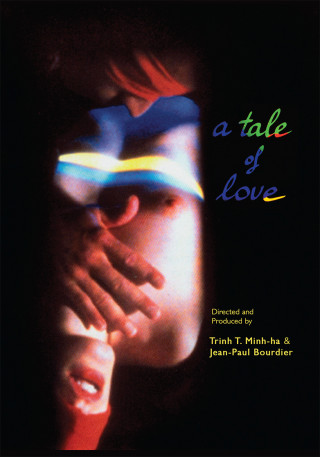
A Tale of Love
A film by Trinh T. Minh-ha, 1995, 108 min, Color
Portraying the Vietnamese immigrant experience through Kieu, A TALE OF LOVE follows the quest of a woman in love with ‘Love’. The film is loosely inspired by THE TALE OF KIEU, the Vietnamese national poem of love which Vietnamese people see as a mythical biography of their ‘motherland,’ marked by internal turbulence and foreign domination.…
Read More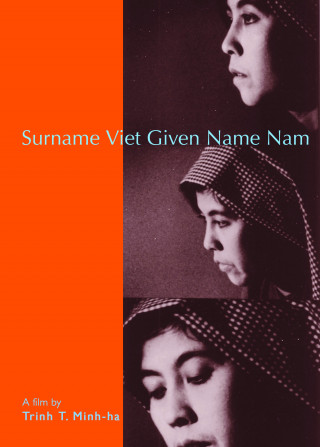
Surname Viet Given Name Nam
A film by Trinh T. Minh-ha, 1989, 108 min, Color
Of marriage and loyalty: “Daughter, she obeys her father/ Wife, she obeys her husband/ Widow, she obeys her son.” Vietnamese-born Trinh T. Minh-ha’s profoundly personal documentary explores the role of Vietnamese women historically and in contemporary society. Using dance, printed texts, folk poetry and the words and experiences of Vietnamese women in Vietnam—from both North…
Read More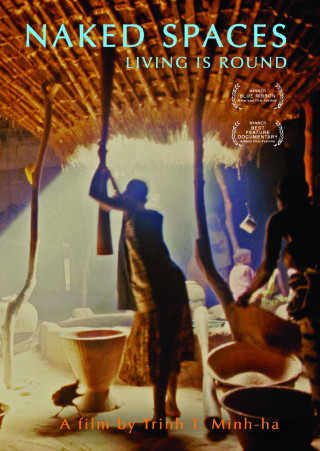
Naked Spaces Living is Round
A film by Trinh T. Minh-ha, 1985, 135 min, Color
Shot with stunning elegance and clarity, NAKED SPACES explores the rhythm and ritual of life in the rural environments of six West African countries (Mauritania, Mali, Burkino Faso, Togo, Benin and Senegal). The nonlinear structure of NAKED SPACES challenges the traditions of ethnographic filmmaking, while sensuous sights and sounds lead the viewer on a poetic…
Read More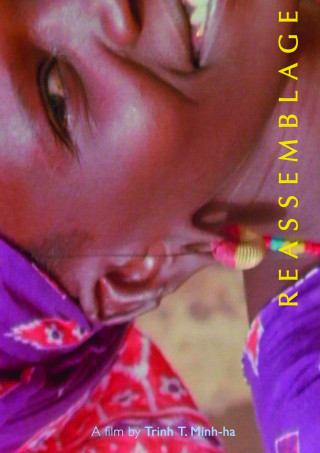
Reassemblage
A film by Trinh T. Minh-ha, 1982, 40 min, Color
Women are the focus but not the object of Trinh T. Minh-ha’s influential first film, a complex visual study of the women of rural Senegal. Through a complicity of interaction between film and spectator, REASSEMBLAGE reflects on documentary filmmaking and the ethnographic representation of cultures. “With uncanny eloquence, REASSEMBLAGE distills sounds and images of Senegalese…
Read More